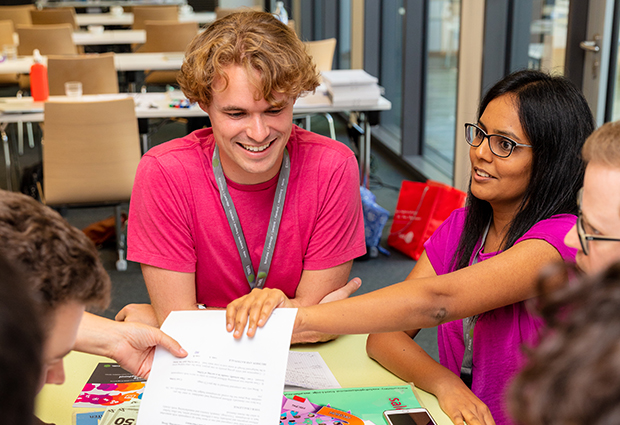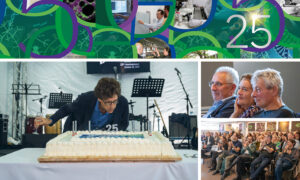
Science in industry
EMBL postdocs discover industry-led research opportunities at the Corporate Summer School

Shveta Bisht and Daniel Schraivogel
For one week in September, twenty postdocs got the chance to hear about exciting research happening within various industries, as part of the EIPOD Corporate Summer School. EIPOD is EMBL’s interdisciplinary postdoc programme, which receives funding from the EU’s Horizon 2020 research and innovation programme under the Marie Skłodowska-Curie Actions. From designing drugs to creating a start-up company, Shveta Bisht and Daniel Schraivogel present their personal highlights, along with the latest developments occurring at the interface between academia and industry.

The future of drug discovery and healthcare
Shveta Bisht
Former EIPOD and current postdoc, Haering group
The Corporate Summer School showcased various flavours of research in industry, including research in the pharmaceutical and healthcare sectors. Over six days, a series of talks by scientists in these sectors highlighted various research avenues – including the intensive procedure used to develop new drugs and clinical treatments. The healthcare industry faces big challenges to develop and prescribe the most effective and safe treatments for patients. Precision medicine – which uses disease biomarkers to tailor therapies to individual patients – can help overcome these challenges.
During the summer school there were several interesting discussions about the future of precision medicine. Rapid advancements in science and technology mean that we might be using big data for precision medicine sooner than we think. Although these concepts were not new to me, learning the details from the experts gave me a fresh perspective. The talk by David Jackson from Molecular Health GmbH inspired me most. He discussed the company’s current data analysis platform in which a patient’s genetic and clinical data are compared against the available data from other patients and clinical trials. This platform can predict the most likely diagnosis, as well as the therapeutic efficacy and safety of individual drugs. These methods have the potential to influence the critical decisions made by medical experts and patients, to enable better disease management.
As well as highlighting the recent technical progress made in industry research, the summer school provided an overview of the research challenges faced by the healthcare sector, as well as scope for its improvement. The detailed insights by the speakers enabled me to identify opportunities where I, as a biochemist, could contribute to drug discovery and the healthcare sector.

Navigating a complex scientific career landscape
Daniel Schraivogel
Current EIPOD, Steinmetz group
My research focuses on the development and application of new genomics technologies, to accelerate our understanding of how genes function in health and disease. I’m interested to know more about research at the interface between academia and industry, and the EIPOD Corporate Summer School uncovered some of these secrets for me. We met with scientists and non-scientific staff who gave us very honest and in-depth insights into their work and their career decisions.
I took several key messages away with me. Firstly, successful researchers in industry choose their jobs with purpose, are enthusiastic about their work, and are willing to develop their skills further. So, don’t choose industry for the wrong reasons! Among these, job stability should not be the major reason for moving into industry. Research in industry works within an essential – but not always stable – cycle of financial profit and science. Therefore projects, departments, or even whole companies are continually in flux.
Secondly, the industrial and entrepreneurial landscape itself is highly exciting and continually developing. Jochen Maas, general manager of research and development at Sanofi Germany, predicts a highly connected research ecosystem that will drive future drug development. This ecosystem consists of agile start-ups, research institutes, hospital clinics and specialised contract research organisations – all of which are connected by pharmaceutical industries at their heart. This network may become particularly important as new competitors such as Amazon and Google, with seemingly inexhaustible financial resources, join the drug development business.
Ultimately, this highly connected ecosystem generates a large space for scientists who work at the interface between industry and academia. Indeed, both sectors are more closely connected than some researchers may think. The scientific outcomes of academic research are of fundamental value to industry, so companies want to collaborate with academic researchers. Whether that’s through industry-supported academic projects or start-up companies created by academic researchers, this collaborative space is highly attractive to me.


